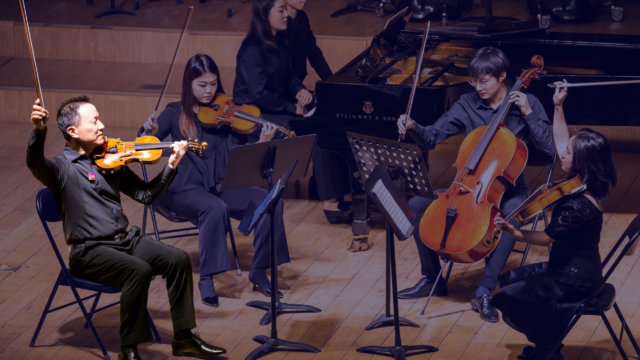Policy Action Ahead as Congress Returns to DC
September 2, 2025
In This Issue
- Action: Speaking Up for Music and Conservation
- Support Arts in Education Week: September 14-20, 2025
- Keeping up Momentum on NEA Advocacy
- Increased Visa Wait Times and Processing Issues
Action: Speaking Up for Music and Conservation
The rules for international travel and trade with musical instruments that contain natural materials protected under the Convention on International Trade in Endangered Species of Wild Fauna and Flora (CITES) are being reconsidered in November 2025. The League will attend as the 185 global parties to the CITES treaty meet at the 20th Conference of the Parties (CoP20) to consider new policy proposals for worldwide implementation. Brazil has introduced a proposal to list Pernambuco at the highest level of protection under CITES, which would require extremely burdensome permit requirements for international travel with bows in use by many musicians, and place very tight restrictions on international sales of existing and new bows. The U.S. Fish and Wildlife Service is currently inviting public comments to inform the U.S. position. In addition to the comments that will be filed by the League in partnership with the American Federation of Musicians other national organizations, individual orchestras and musicians can write to request U.S. support for a policy solution that will avoid applying a CITES permit requirement every time a musician with a bow travels internationally, while maintaining protections for sustaining trees. To file comments, stakeholders within the U.S. can go to this Federal Register page and share your thoughts by September 17, 2025. Find essential background in the League’s Pernambuco Policy resource page.
Support Arts in Education Week: September 14-20, 2025
The 2025 National Arts in Education Week takes place the week of September 14. Each year the League encourages orchestras to share testimonials, photos, and video demonstrating your orchestra’s support of in-school music education. This week is a valuable part of year-round efforts to improve access to arts education by building support across your local schools, audiences, and elected officials. If you are partnering with local schools during the week to support their music and arts education efforts, this would be a great time to invite your U.S. Representative to see your orchestra in action, document the visit in your newsletter or social media, and follow up by asking for support for arts education at the federal level. Post with #artsedweek or #artsed and tag the League so we can share some of your posts during that time!
Keeping up Momentum on NEA Advocacy
Advocates received great news just before Congress adjourned for the August recess, as the Senate Appropriations Committee advanced a recommendation to protect and continue funding for the National Endowment for the Arts at $207 million for FY2026. Thanks to all of the orchestra advocates that are continuing to reach out to elected officials to discuss the strong public support for the federal investment in arts and culture in communities throughout the country. Meanwhile, the League continues to update our NEA resource page and our Resources for Navigating the Changing Landscape with the latest information about NEA grantmaking requirements, as we await further information and guidance regarding implementation of the recent executive order on improving oversight of federal grantmaking, and a July 29 Department of Justice memorandum on federal anti-discrimination laws. Stay tuned as the League keeps you informed of next steps on the Hill and at the NEA.
Increased Visa Wait Times and Processing Issues
Orchestras that engage international guest artists are experiencing ever longer visa processing times and fee changes are ahead. U.S. Citizenship and Immigration Services (USCIS) is removing transparency about which service center is processing each petition and the related processing times. With regularly-filed O and P artist petitions now taking 8-12 months to process, nearly all petitioners must pay for the Premium Processing Service. Consular visa processing, which follows USCIS approval, is also shifting as the Department of State has announced that, effective September 2, 2025, very few interview waivers will be granted, forcing longer lines for consular visa interviews.
USCIS will discontinue accepting paper check and money order payments after Oct. 28, 2025, and will accept only ACH debit transactions from a U.S. bank account using a new Form G-1650 or credit card payments using the existing Form G-1450. Meanwhile, the substantial U.S. budget and tax bill signed into law early last month authorized a new $250 Visa Integrity Fee along with increases to ESTA and I-94 requests, but these have not yet gone into effect, and very little detail about implementation was provided in the legislation. A new Visa Bond Program is also being piloted, which is currently limited to visitors on B1 or B2 visas from Malawi and Zambia.
Check out the League’s latest news alert on our Artists from Abroad website to learn more.
Related
-
Learn | Youth Orchestras
Creative Expression, Caring Relationships, and Career Pathways
-
Learn | Governance
Spotlight: Sarah Generes
-
Learn | Travel with Instruments
Know Your Bow: New Rules and Essential Steps for Pernambuco Sustainability
Become a member
Thank you for your interest in the League of American Orchestras! We are dedicated to advancing the orchestral experience for all.
Join Now

